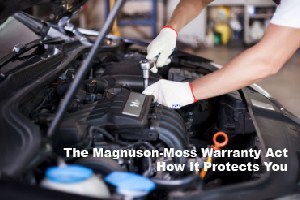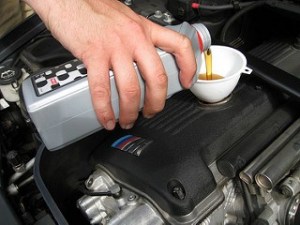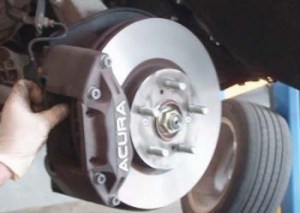
by admin | May 7, 2019 | Brakes
Did you recently purchase a new vehicle? Are you leasing one? It’s not uncommon for car dealerships to tell their customers they must have their vehicle serviced and repaired there or the manufacturer’s warranty will become void. This is simply not true. In actuality, there is something called the Magnuson-Moss Warranty Act, that protects you. The key is to know your rights under this act.
According to the Magnuson-Moss Warranty Act, it is illegal for manufacturers or dealers to claim your warranty becomes void when someone other than the dealer does the work. What does that mean? Hopefully we will be able to answer that by providing the answers to some frequently-asked questions about vehicle warranties.
Q. Must I take my vehicle to the dealership where I purchased it for routine maintenance like oil and filter changes?
A. No. The act says you can take your vehicle anywhere you would like, whether it is for oil changes, cooling system service, and any other routine maintenance and repairs. If you’re the do-it-yourself type, you may also do the work yourself. Selecting any of these choices for auto maintenance or repair will not void the manufacturer’s warranty.
Q. What types of auto repair or maintenance services are covered under vehicle warranties?
A. As you can imagine, every car manufacturer has its own warranty coverage. The ones that are most common are bumper-to-bumper and powertrain warranties. As the name implies, a bumper-to-bumper warranty typically covers most items from the front to the back bumper of your vehicle. These warranties last for a specific amount of time, like 3 years or 36,000 miles. To apply that to real-life, if you have an engine failure or the oil begins leaking because of material or workmanship defects, the dealer will make the repairs at no cost to you. Normal wear and tear items like tires, oil/filter changes, brakes, cooling system service are not covered under the vehicle warranty.
Q. What types of things would void the manufacturer’s warranty?
A. While you can bring your vehicle to be serviced anywhere, you must follow the minimum maintenance schedule outlined in the owner’s manual. You are also required to use the proper brand(s) of fluids and parts for your vehicle. If you fail to do any of these things, you void the warranty. That means if the engine has a problem needing repair, you will have to pay for it.
The easiest way to make sure the manufacturer’s warranty will cover your vehicle is to have it maintained and repaired at one place, like Campus Repair in Ft. Collins, Colorado. We keep detailed records of all the services we perform on your vehicle, and if there are parts that need to be replaced, we will let you know. We will also tell you when a needed repair is covered under the manufacturer’s warranty so you can have it done at your dealer at no cost to you. Call or stop by the shop for your next vehicle service.

by admin | Apr 18, 2019 | Brakes
Spring is always a welcome sight, especially after a harsh winter. Our landscape certainly lends itself to scenic drives. Of course, there’s always spring and summer baseball season for the kids and all sorts of weekend activities that require a lot of back and forth driving. There’s certainly no time in anyone’s schedule for unexpected car repairs. That’s why we put together these 7 tips on how to get your vehicle ready for summer.
The simplest way to avoid engine problems, is to make sure you take care of regular vehicle maintenance. Following these 7 tips will make sure your vehicle is running its best for summer driving:
- Oil and Filter Change – Changing the engine oil and filter when required will extend engine life by making sure vital parts are well-lubricated. Use a high-quality oil and filter – it’s worth the extra cost. If the oil and filter has been changed recently, at the very least, check the level and condition of the oil once a month. This is especially important if your vehicle is older. If you find you have to frequently add more oil, there is most likely a problem that needs to be addressed.
- Other Vital Engine Fluids – When did you last check the transmission fluid? Is the coolant able to protect your engine from overheating this summer? Most people don’t think of checking the other fluids in their vehicles. This can lead to problems down the road as fluids begin to get old and break down. For example, coolant that is old won’t be able to prevent overheating and parts in the cooling system will start to corrode leading to premature failure of cooling system parts. When checking the level and condition of fluids, follow the instructions in the owner’s manual. If you’re not sure how to check the fluids, no need to worry. We will check them for you when you bring your vehicle in for an oil service.
- Tires – Change out your snow tires. If you are using all-season tires, have them rotated. Replace tires that show signs of excessive wear.
- Wiper Blades – Rough winters can wreak havoc on wiper blades. Changing the wiper blades will maximize your ability to see in inclement weather.
- Brakes – Most vehicles allow for easy viewing of the brake pads. If the brake pads are thinning, you will want to have them replaced. If you have any concern about the brakes or you don’t feel comfortable checking the pads yourself, stop by the shop and we can check them for you.
- Vehicle Exterior – Give your vehicle a good wash and wax. When washing, make sure to include the underbody and wheel wells.
- Vehicle Interior – Show the inside of your vehicle some love, too, by vacuuming floor mats and seats, and applying a protectant to leather and vinyl.The best way to avoid unexpected car repair costs is to make sure your vehicle is maintained regularly. The car repair professionals at Campus Repair in Ft. Collins, Colorado are equipped to assist you in this area. Give us a call or stop by the shop to schedule your spring vehicle maintenance.

by admin | Dec 10, 2018 | Brakes
Buying a new vehicle is a steep investment. Buying a used one can be, too. The only way to maintain or increase the life of your vehicle is through preventive vehicle maintenance – that’s maintenance that is done to make sure fluids and filters are changed regularly and parts are replaced before they fail. If you want to avoid new car payments or expensive and unnecessary repair bills, a commitment to preventive vehicle maintenance is a must. Here are 8 things you can do that will increase the life of your vehicle.
- Choose high-quality fluids and replacement parts. Yes, you may pay a little more when you receive the service, but you will notice the benefits as your vehicle gets older. High-quality fluids will protect your engine parts better so everything runs better and parts won’t wear out prematurely.
- Make sure you maintain the cooling system on a regular schedule. The antifreeze/coolant is your vehicle’s cooling system does a couple of things. First, it keeps the engine from overheating. Next, the coolant is designed to protect internal engine parts from becoming rusted and corroded. Older fluid can be very detrimental to your engine. It will run hotter and parts will wear out faster. Even worse, if the engine overheats, you could face having to replace the engine… or your vehicle. Along with cooling system maintenance, replace any hoses and belts that are beginning to show excessive wear.
- Service the transmission. When was the last time you checked the level and condition of your transmission fluid? This simple fluid check can tell a lot about what’s going on in the transmission. If you have to add fluid, it smells like it’s burnt, or the fluid color looks dark brown or black, you have a transmission problem. Follow the guidelines in your vehicle’s handbook to know when to service the transmission. If you are towing with your vehicle or place a heavy load on it, you will need to change the fluid and filter more often. An important note of caution… if you have never changed the transmission fluid or filter and your vehicle is approaching 80,000 to 100,000 miles, do not go out and have this service performed. Doing so can stir up dirt and pieces of metal that can cause a problem with your transmission. Check with us before scheduling a transmission service.
- Replace belts before they break. This is especially important when it is the timing belt. Yes, timing belt replacement is expensive; however, if you wait until the belt breaks, you will most likely need to replace the engine or your vehicle.
- Maintain the tires, suspension system and brakes. This is vital. If you drive on under- or overinflated tires, tires that are wearing unevenly, brakes that need to be replaced and/or a suspension system that is showing signs of a problem, you are putting yourself and others at risk. Have the tires rotated every 3,000 to 5,000 miles and replace them when they show signs of excessive wear or the tread depth is low. Check tire air pressure once a month and add air, as needed. Replace brake pads when we let you know it’s needed. If your vehicle is swaying more around turns or vibrating more on bumpy roads, have the suspension system checked.
- Watch for any signs and symptoms that show there’s a problem with your vehicle. If you hear strange sounds when driving, notice fluid leaks under your vehicle or smell something odd when driving, get it checked out.
- If you have a garage, keep your vehicle in it. Vehicles that are garage-kept last longer than those parked outside all the time. Air pollutants cause corrosion, rain and snow cause rust, the sun will fade the plastics and fabrics in the interior.
- Clean the interior and exterior of your vehicle regularly. By keeping the exterior clean and waxing it, you will make sure the paint finish will be protected. It’s also a good idea to hose off the underbody to remove road dirt and salts. Clean and vacuum the interior once a month and apply protectant to vinyl or leather.
The simplest way to make sure your vehicle maintenance is handled regularly is to bring it to Campus Repair in Ft. Collins, Colorado. We keep detailed records of the services we perform on each vehicle. We also conduct a courtesy inspection with each service to let you know if anything needs to be replaced. Call or stop by to have us take care of your next vehicle maintenance.

by admin | Sep 16, 2018 | Auto Repair Northern Colorado, Brakes, Campus Repair
Have you ever been driving and heard a squealing sound that stops when you apply the brakes? This is one of several signs you need new brakes. The brakes undergo wear and tear every time you apply them. How quickly the brake pads need to be replaced depends on a number of factors. Hitting the brakes all the time, driving in stop-and-go traffic and a larger/heavier vehicle can all cause brakes to wear out quicker. Read on to learn more about the braking system and some of the common signs you need brake repair.
Before we go further, if you ever have a concern about whether or not your brakes are working properly, have us check them out for you in our auto repair shop in Fort Collins, CO. It’s better to be safe than sorry, especially when it comes to being able to stop your vehicle. Brake problems can sometimes result in limited or no braking ability. In addition to the safety issues associated with poorly operating brakes, if you don’t take care of brake issues right away, you’ll end up having a much higher repair bill.
A Brake Job is Necessary When These Things Occur
- If the brake warning light comes on and stays on, there’s a serious problem with the braking system. How can you tell that it’s a serious problem? Warning lights that are “red” in color are alerting you to a critical problem. It’s important to note that, in some vehicles, the brake warning light is the same one used to alert you when the emergency brake is engaged. If you put the emergency brake on when you stopped the vehicle, make sure to disengage it before you start to drive. If the emergency brake isn’t on, but the brake warning light is on, you need to have the braking system checked right away. Do not drive your vehicle. Instead, have it towed to Campus Repair.
- There’s a high-pitched squealing sound when you drive that goes away when the brakes are applied. This is often a symptom of the wear indicators on the pads that are made to alert you it’s time for new brake pads.
- You hear scraping or grinding noises from metal-to-metal contact. Quite often, this sound is coming from brake pads that no longer have any pad left on them so the metal is scraping on and grinding into the rotor. You should have the brakes repaired immediately.
- You need to use extra pressure to apply the brakes. This is also known as “hard pedal.” Often times increased brake effort is due to lack of power assist by the brake booster. Brake boosters can run off of engine vacuum or power steering fluid. Again, have your brakes repaired immediately.
- If the brakes feel spongy or soft when you apply them, you are experiencing “soft pedal.” Your braking ability is definitely hindered, and it could be occurring because of air that’s entered the brake lines, brake lines that have gone bad, worn calipers or a master cylinder that needs to be replaced. Have the brakes inspected and repaired right away.
If you suspect there is a problem with your braking system, don’t wait to act. The technicians at Campus Repair in Fort Collins, Colorado, will inspect the braking system. During the brake inspection, we will look at the brake pads to see how much life is left on them. We will also check for evidence of rough spots or damage and will inspect the brake lines to make sure they are in good condition. Call or stop by the shop today.




